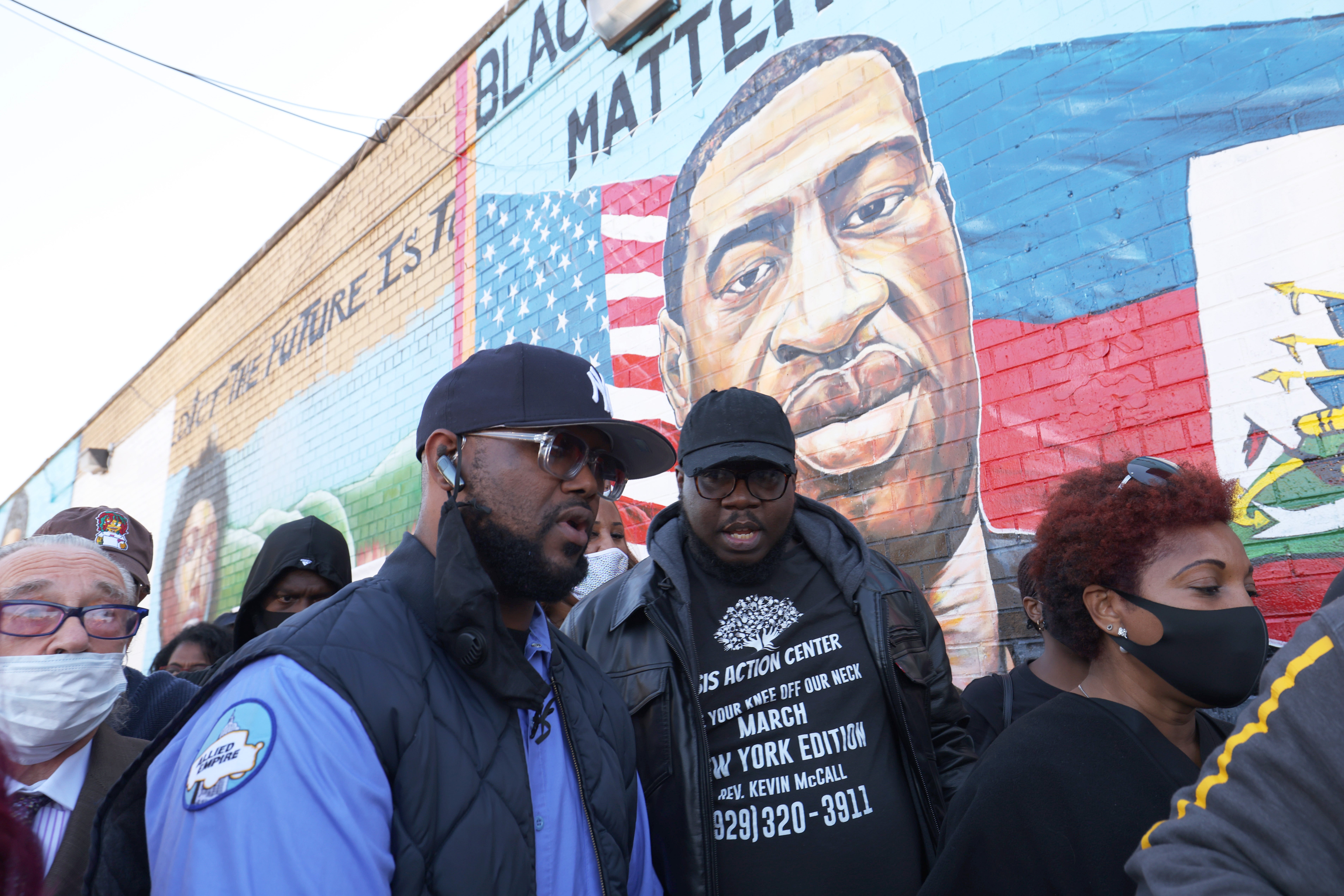George Floyd: Minneapolis agrees record-breaking $27m settlement with family
Settlement won’t affect the ongoing case against Derek Chauvin

The Minneapolis City Council unanimously has approved a $27m settlement with the family of George Floyd, an unarmed Black man who died in the custody of Minneapolis police last May.
From the settlement, the largest in US history, $500,000 will go to funding community programmes near the intersection where he died.
“If I could get him back, I would give all of this back,” Philonise Floyd, Mr Floyd’s brother, said at a press conference on Friday about the settlement. “I know that he’s with us, standing up right now, knowing we have the opportunity to be able to fund low-income African American communities.”
Mr Floyd’s brother also thanked the millions of protesters across the world who rallied after Mr Floyd’s death, coming together even in the face of the pandemic.
“You put your lives on the line,” he said. “There’s nothing I can do to be able to repay you for that because you showed who you were at that time.”
Ben Crump, a civil rights attorney representing Mr Floyd’s family, said the settlement marked a turning point.
“It’s not just enough for America to say that Black lives matter,” Mr Crump said. “We have to show that Black lives matter by our actions.
“So the family of George Floyd and his legal team, we and are very grateful for not just saying you care about George Floyd, but showing you care, not just saying Black lives matter, but showing to the world that Black lives matter.”
The family filed a wrongful-death lawsuit against the city in July, accusing officers of “unjustified, excessive, and illegal and deadly use of force”. The suit sought to make it “financially prohibitive” for officers to “kill marginalised people and Black people in the future in America”.
Minneapolis mayor Jacob Frey said the settlement reflected the city’s commitment to advancing racial justice.
“A centuries-in-the-making reckoning around racial justice struck Minneapolis like a thunderbolt,” Mr Frey said during the press conference. “And that strike reverberated across the entire globe as we all stood and watched as George Floyd was killed.
“Amid unprecedented loss, amid unprecedented pain, we now have a once-in-a-generation opportunity to truly effectuate change.”
The settlement will not affect the ongoing criminal case against Derek Chauvin, the former Minneapolis police officer charged with murdering Mr Floyd, which began this week.
“There is no amount of money that can replace a brother, a son, a nephew, a father, a loved one,” council member Andrea Jenkins said of the decision. “But what we can do is continue to work towards justice and equity and equality in the city of Minneapolis.”
In 2019, the city settled for $20m with the family of Justine Ruszczyk, who was shot and killed by Minneapolis police officer Mohamed Noor, in one of the largest police wrongful-death settlements in US history.
The city is self-insured, so settlement payments come directly from the city budget, and the sum headed to George Floyd’s family is similar to Minneapolis’ total spend each year on its health department.
A county court began seating jurors earlier this week in the trial of Mr Chauvin, who faces second-degree murder and manslaughter charges, as well as a recently added third-degree murder charge, over the Floyd incident. Six of 14 jurors have been seated.
State prosecutors and Mr Chauvin’s attorney have gone over the rules for the trial, including whether potentially charged phrases like a police officer lacking “20/20 hindsight”, or calling Mr Floyd a “gentle giant”, can be put to juries.
During the press conference, the Floyd family also called on demonstrators to remain peaceful as the fight for police reform continues.
“George Floyd himself, during the Ferguson unrest, after Michael Brown was killed by the police, and people were saying, ‘Hands up, don’t shoot’, George Floyd shared on social media that everyone needs to remain peaceful,” Mr Crump, the family’s attorney, said. “Everybody around the world, let’s follow George Floyd’s example in being peaceful as we stand up for justice.”
They also called on Minneapolis police to reform and break the “python grip” of the force’s union contract, and for Congress to pass the George Floyd Justice in Policing Act, a bill that would ban chokeholds and reform qualified immunity for officers, making it easier to bring misconduct cases against the police.
One major reform being discussed is replacing the Minneapolis Police Department altogether. On Friday, the same day the settlement was announced, the city council advanced a proposal to replace the MPD with a new public safety department, after attempts to replace the force failed last year.
“Out of transformational pain must come transformational change,” city council vice president Andrea Jenkins said at the event. “This is required of Minneapolis. We are committed to lead the way because Black lives matter in this city. Not just George Floyd’s life, but all Black life.”
Mr Chauvin’s trial hung over the announcement of the settlement, and Mr Crump warned the process would try to “assassinate” Mr Floyd’s character.
“It is the most egregious and shocking documentation of an American citizen being tortured by a police officer that most people have ever seen in history,” he said. “We should not say because a Black family gets a civil settlement, they cannot also get criminal justice,” he added.
Council member Ms Jenkins more directly acknowledged the possibility that Mr Chauvin might not be prosecuted, which could trigger widespread outrage in the same way past cases have, like the acquittal of the officers involved in the Rodney King beating.
“I want to ask for calm in the streets, regardless of the outcome of that trial,” she said. “Everyone in the city of Minneapolis is committed to bringing justice, in more ways than just through our criminal justice system.”
Join our commenting forum
Join thought-provoking conversations, follow other Independent readers and see their replies
Comments


Bookmark popover
Removed from bookmarks